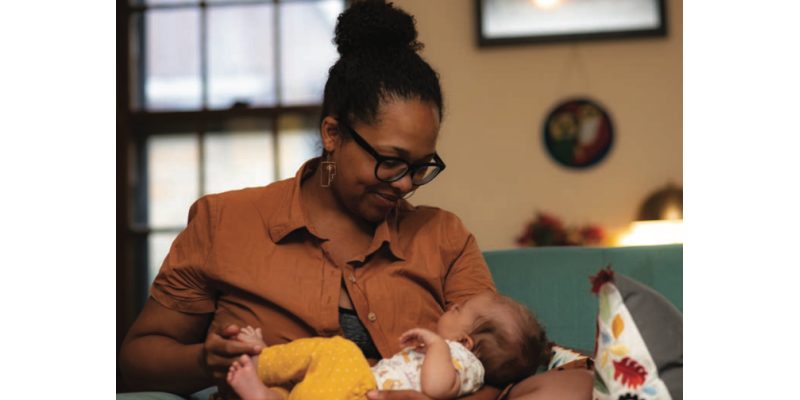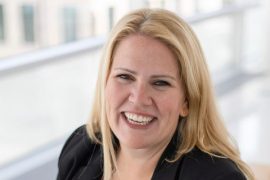By UnityPoint Health – Meriter
“I think it’s pretty amazing to look at a person who’s growing rapidly and think all the nutrients that they need comes from you,” shares Ali Muldrow. Breastfeeding has “been an easy thing to love doing.”
Less than two months old, Muldrow’s daughter, Frida, is nursing on demand. She breastfed her two other children as well.
“I wish the whole framework that we thought about breastfeeding changed. And I think seeing breastfeeding as this divine right, to take care of your baby and seeing yourself and your body as something that you are in charge of — I think is something Black women are denied aggressively. This conversation about whether or not Black women are choosing to breastfeed is the wrong conversation. This is not a choice,” says Muldrow.
For Muldrow, who is well-known in the Madison community as the co-executive director of GSAFE, an organization working to create just schools for LBGTQ+ youth, taking charge of your health is about reclaiming liberation.
“It’s something we can do for ourselves and for future generations,” says Muldrow. “In breastfeeding, you are taking something back for the next generation of people that we were robbed of. We’re robbed of time with our kids, robbed of affection and our children are denied the right to be children right from the beginning.”
A 2018 study on social, cultural and historical influences on Black breastfeeding found that multiple factors were listed contributing to Black women not breastfeeding, including discouragement from family members and historical connotations tied to breastfeeding, citing slavery and “wet-nursing” as detractors. The report notes that because of this, “there are potential contributions of generational, cultural and historical factors.”
Muldrow explains, “The average slave gave birth multiple times during adolescence, and then was forced into forced labor about two weeks later. So, this idea that there’s space for Black women to rest and heal and bond with their baby, that’s been completely devalued throughout the history of our society. We actually have never recovered from that,” she continues. “You have to have a conscious conversation about what does it look like to recover and reclaim. It means, yeah, breastfeeding, but it also means having the financial reality and the housing and the employment support and the space and the equipment to pump and the different things that you need to support you in breastfeeding.”
While UnityPoint Health-Meriter offers many avenues of support, like breastfeeding classes and lactation consultants, there is more that we need to do, which is why hearing experiences like Muldrow’s are so valuable. Learning and change occurs through listening to the experiences of Black women and hearing from them what types of supportive programs would be the most beneficial to them.
One such avenue for providing valuable feedback is through the Patient and Family Advisory Committee (PFAC), comprised of community members and employees, led by the Patient Experience Partners. Any community member is welcome to apply to join. Patients are welcome to share experiences with our Patient Representatives at (608) 417-6462.
UnityPoint Health-Meriter is also actively involved in the Saving Our Babies initiative. To learn more about the program, visit Saving Our Babies – Foundation for Black Women’s Wellness at ffbww.org.
“Positioning Black women to have healthy pregnancies and to have healthy babies and to feel confident in caring for their kids — that’s about reorienting our society to Black women as human beings,” says Muldrow as she shifts Frida to her other breast, who has been feeding consistently and with gusto. “She believes in it,” Muldrow laughs, “she feels completely entitled to growing.”




